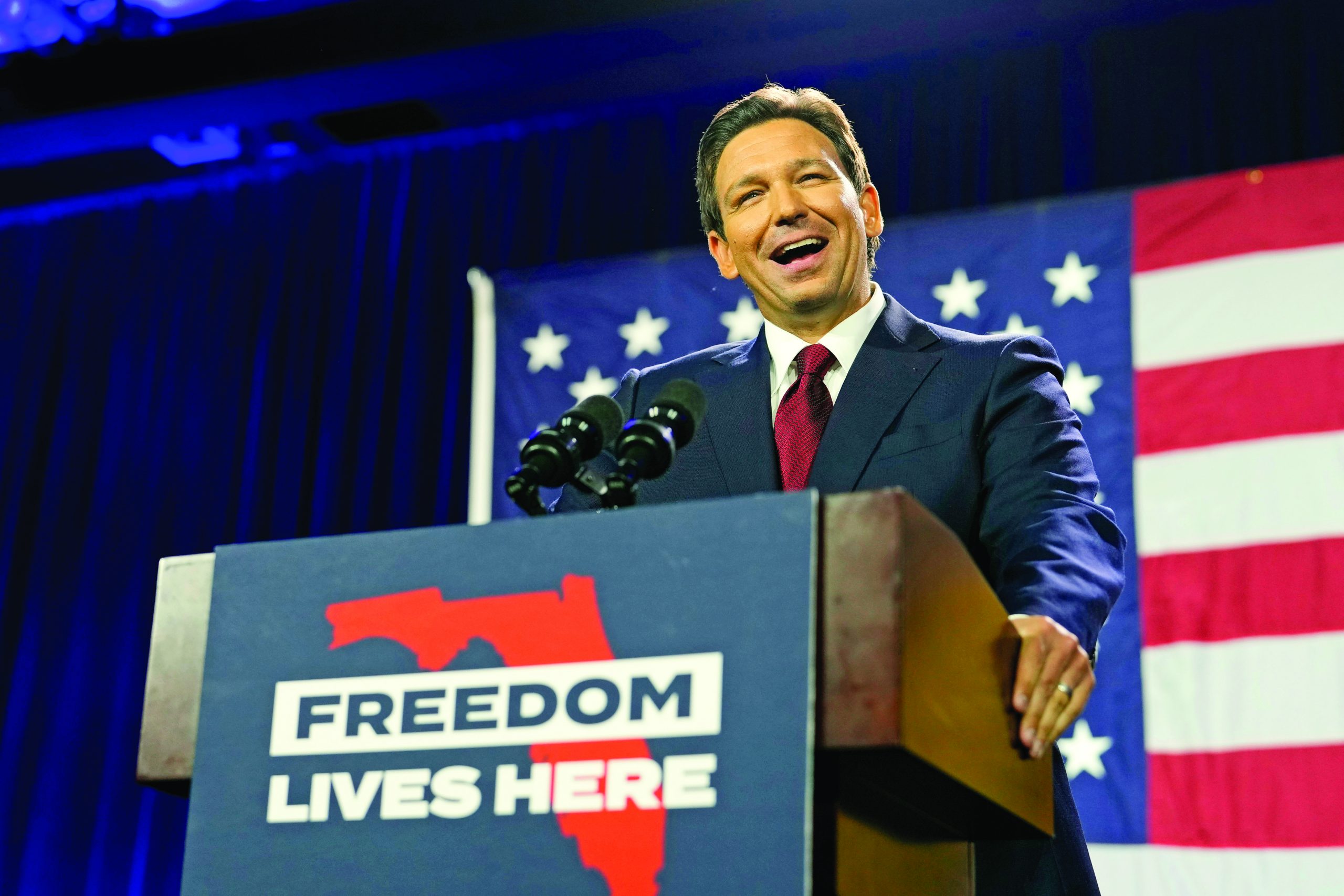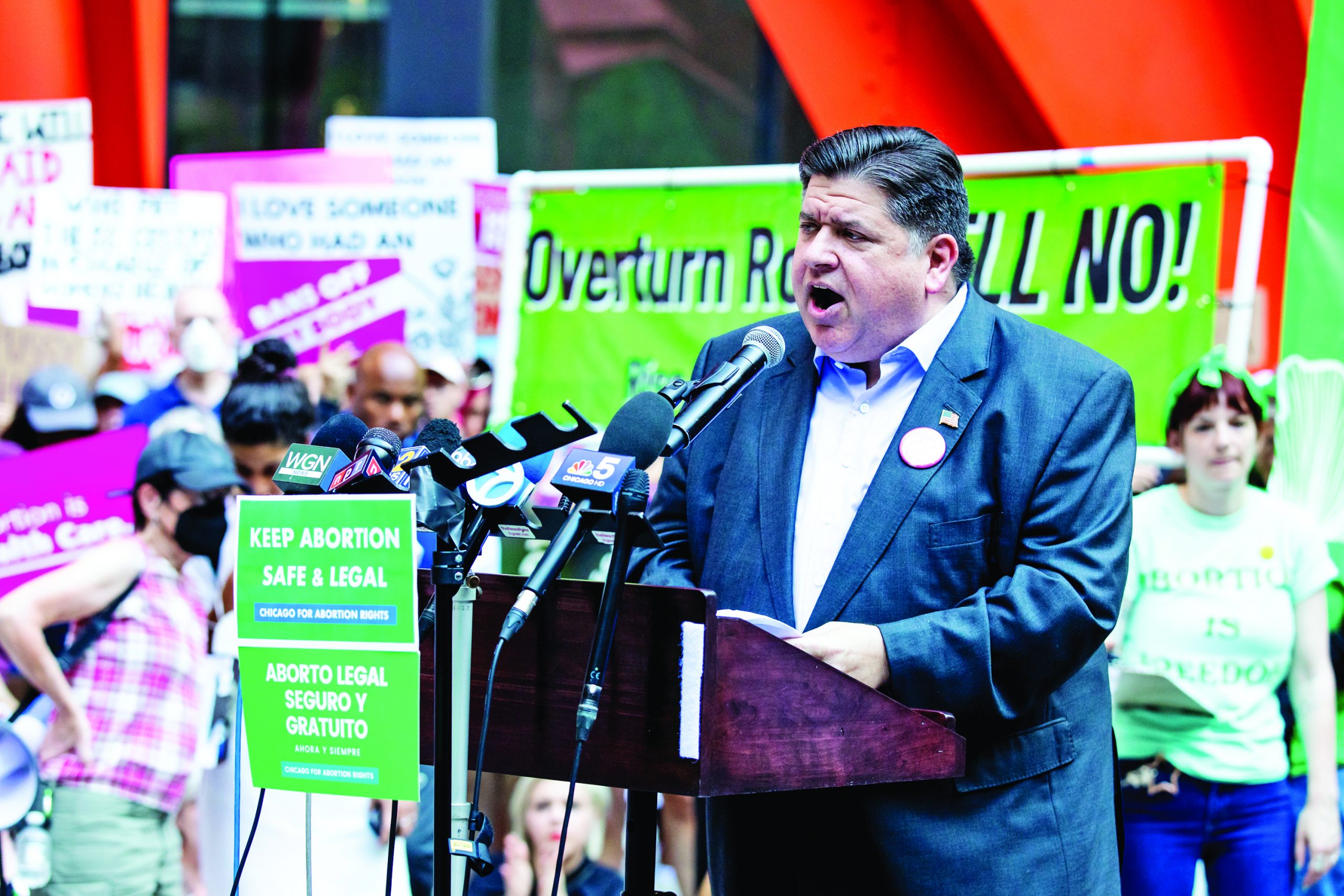Imitation, the saying goes, is the sincerest form of flattery. If that’s true, then Ron DeSantis is the most admired governor in America. Just don’t tell his Democratic counterparts in some of the nation’s biggest blue states who, judging by their actions, might be his greatest admirers of all.
Florida’s chief executive first made a name for himself when he became one of the earliest governors to roll back lockdowns and reopen his state during the initial phases of the coronavirus pandemic. He then moved to bar vaccine mandates and other restrictions. Since then, he has advanced one conservative cause after another. Particularly gratifying to his many supporters, DeSantis has striven to turn Florida into a place, in his own words, “where woke goes to die.” Most recently on this score, he has moved to dismantle the diversity, equity, and inclusion apparatus in Florida’s public universities.
BIDEN IS RUNNING FOR REELECTION — ISN’T HE?
The College Board discovered DeSantis’s antipathy for wokeness the hard way after he announced Florida would reject its new African American Studies Advanced Placement course because state education officials had rightly concluded from a review of its draft curriculum that it would be used as a vehicle for leftist political indoctrination. In response, the organization removed critical race theory, “black queer studies,” reparations, and other objectionable topics from course materials. But its initially conciliatory tone incited a furious backlash by left-wing scholars and activists, prompting the College Board to release a statement “denouncing the Florida Department of Education’s slander” and walking back many of the curricular changes. This in turn led DeSantis to muse that it may be time for Florida to “reevaluate” whether it wants a relationship with the testing outfit at all.

After Disney’s then-CEO Bob Chapek objected to Florida’s parental rights in education law, which limits discussions of sexual orientation and gender identity in kindergarten through third grade, DeSantis said he would strip Disney of its control of the Reedy Creek Improvement District, the independent entity through which it governs Disney World. Two weeks ago, Florida lawmakers passed legislation placing Reedy Creek under the authority of a board appointed by DeSantis. Nor has he been afraid to challenge his own side, as he did when he forced Republicans in the statehouse to pass a new congressional map much more friendly to the GOP than the one they had proposed. With a new legislative session impending, DeSantis is looking to add notches to his belt on gun rights, abortion, “and other Republican red-meat issues,” as Reuters’s James Oliphant put it.
DeSantis’s pugnacious attitude and overt disdain for COVID-19 alarmists, the media, corporations, the Left, and other conservative bêtes noires, combined with his nearly 20-point margin of victory in his reelection campaign, have made him a national figure. Moreover, they’ve turned him into a rock star in the GOP. So much so that Republicans across the country have started following his example. “From the Mountain West to the Deep South,” according to the Washington Post, “Florida-style bills are springing up in state legislatures, signaling the growing influence of DeSantis as an ideological leader for a Republican Party that had been shaped in the image of former president Donald Trump.”

Democrats have taken notice, and unsurprisingly, they don’t like what they see. As the likeliest alternative to Trump as the 2024 GOP nominee, DeSantis has already been anointed, as every Republican who threatens to occupy the White House is, “the worst Republican since Trump/Bush/Reagan/Nixon/Hitler/the last one.” He’s “the Genghis Khan of social issues,” thundered Vanity Fair’s Molly Jong-Fast, “using every opportunity to target and demonize groups that have already been targeted and demonized throughout history.” Adopting a more restrained but no less predictable tone, liberal activist Brynn Tannehill decried DeSantis in the New Republic for “pursuing one of the most aggressively authoritarian agendas in the country.” And New York Times columnist Pamela Paul fretted that there may be nothing liberals can do “other than quietly seethe, loudly condemn him every time” he makes news, and hope he self-destructs before he gets near 1600 Pennsylvania Ave.
Liberals despise DeSantis. Yet they’re also afraid of him. Paul and Tannehill’s columns reveal why. Hostile as they are, they can’t help evincing a grudging respect for him. “DeSantis is demonstrably intelligent and industrious,” Paul admitted. “He has discipline, motivation, and an intimate knowledge of how to use the system to get what he wants,” Tannehill conceded. And, as Paul noted, his policies are popular with Floridians across the aisle.
Democrats have a love-hate relationship with DeSantis. For all they can’t stand his policies, they can’t help wishing they had someone on their side who’d smite their foes and implement their agenda with the same relentlessness and relish. What they want, in other words, is a blue-state DeSantis, a Florida man of their own.

There are several aspirants for the mantle. One is J.B. Pritzker. Coming off his own big reelection in November, Illinois’s governor “is setting himself up as the liberal answer” to DeSantis on a range of areas, from guns and abortion to education, reported the Hill. Or as NBC News’s Natasha Korecki framed it, “In style, policy, and substance, Pritzker has come to symbolize the anti-DeSantis governor.”
After DeSantis disclosed Florida’s rejection of the AP course, for example, Pritzker demanded the College Board not alter it “to appease extremists” in Tallahassee and their “racist and homophobic laws.” The Washington Post’s Greg Sargent, a reliable relay for the latest Democratic talking points, praised Pritzker for offering “a liberal cultural agenda as an alternative to the reactionary culture-warring now underway in Florida and other red states” and urged Democrats to join Pritzker in establishing their states “as places where Florida-style school crackdowns go to die.” Pritzker’s avowed goal is slightly loftier: to erect Illinois as “a beacon of Democratic values in the center of the country.”
By the time of the AP kerfuffle, DeSantis was a familiar target of Pritzker’s ire. In a speech he gave to Democrats last year in Tampa, he anathematized his Sunshine State peer as “Donald Trump with a mask on” and charged him with three of the gravest crimes in the liberal code: “racism, homophobia, and misogyny.” Pritzker’s fellow Democrats lapped it up. Daniel Uhlfelder, the crank lawyer who paraded on Florida’s beaches in a Grim Reaper costume to protest DeSantis’s handling of COVID-19, called it “the best speech I have witnessed in my life” and expressed his hope that Pritzker would one day debate DeSantis. Pritzker’s anti-DeSantis rhetoric has only grown more inflamed since, slamming him as “a terrible, anti-choice governor” and, just this month, excoriating his “dangerous and hateful agenda” and indicting him as “homophobic” and for harboring “tendencies to promote racism.”
Pritzker’s not entirely talk. Like many blue-state governors, he’s thumbed his nose at the Supreme Court’s Bruen and Dobbs decisions, which expanded gun rights and eliminated the federal right to abortion, respectively. A Pritzker-backed bill to outlaw assault weapons and large-capacity magazines passed quickly at the start of January. A sweeping measure broadening protections for abortion providers and patients received Pritzker’s signature last month as well. The statute also codified the availability, including to children, of the irreversible drugs and surgeries that pass under the anodyne misnomer of “gender-affirming care.” Illinois has some of the country’s most liberal abortion laws, but Pritzker wants it to join states like California that have recently incorporated abortion rights into their state constitutions.

One of those states is Michigan, whose voters in November approved an initiative enshrining “a fundamental right to reproductive freedom.” At the same time, they reelected incumbent Gov. Gretchen Whitmer by a double-digit margin over her Trumpy opponent. Now she finds herself also being appraised for the blue-state DeSantis crown.
She might be able to seize it, too, since Democrats gained full control in Lansing for the first time since 1983. Whitmer’s 2023 program contains a host of liberal priorities, including new gun control measures such as universal background checks, red flag laws, and safe storage requirements. She also wants to repeal Michigan’s 1931 law banning abortion and expand civil rights protections for LGBT persons. Also on the wish list is undoing the right-to-work law passed in 2012, the existence of which continues to rankle Michigan Democrats. But it’s not just progressive red meat on the menu. Whitmer also wants to increase education funding, expand the state’s earned income tax credit, and erase Michigan’s tax on retirement income.
With her party’s first trifecta in four decades, Whitmer has not only the desire but the opportunity to flex her power and push through what one observer of Michigan politics perhaps undersold as “an ambitious Democratic agenda.” Sargent, the Democratic-groupthink epigone, hailed Whitmer and company for starting “their legislative session with a barrage of culturally liberal legislation” and advised his compatriots to “keep an eye on Michigan” to see how liberals can “counterprogram” red states’ “hard-right turn by redoubling their own use of state governments.”
Combining policies that appeal to the base with those aimed at the middle of the electorate isn’t the only way Whitmer resembles DeSantis. Like him, she provokes the revulsion of her opponents, who see her as someone a little too eager to explore the territory where petty tyranny borders on the comical. Her decision to order stores to close their gardening sections as part of her stay-at-home directive at the beginning of COVID-19 certainly was petty, but many Michiganders didn’t find it funny at all.
Whitmer drives conservatives mad. But no Democratic governor inspires more visceral loathing on the right than California’s Gavin Newsom. Nor has any blue governor evinced more zeal to engage in political fisticuffs with opponents: which is why he’s Democrats’ most likely anti-DeSantis.
It’s a rivalry Newsom, who also won in a landslide last November, has himself touted. Introducing legislation to tighten California’s gun permitting regulations, he criticized Florida Republicans’ plan to move to a system in which all legal gun owners can carry a gun in public without a permit. Last summer, Newsom purchased time on Florida TV stations to run an ad urging Floridians to move to California because “freedom is under attack in your state.” As proof, Newsom cited Florida’s new abortion limits and ban on critical race theory and its moratorium on discussions of sexual orientation and gender identity until fourth grade.
Newsom wants Democrats to take a much more aggressive stance on cultural issues. “Where the hell is my party?” he wondered after the draft of the Dobbs decision leaked. “Why aren’t we standing up more firmly, more resolutely? Why aren’t we calling this out?” Newsom, in the estimation of the Atlantic’s Ron Brownstein, is best positioned to lead the counterattack against what Brownstein terms “the rights rollback” in Republican-led states, not least because no Democrat “is itching more for a fight with the Republican governors leading the red-state charge.”
California is the ideal launching pad, and not just because Newsom has taken conventional steps such as signing laws effectively transforming the Golden State into a “sanctuary state” for abortion and transgender rights. Rather, California is the perfect headquarters for the progressive counteroffensive because it embodies so much of what conservatives revile. It’s the land of Hollywood and high taxes, of San Francisco gay pride parades and illegal immigration, of bans on gas stoves and gas cars, of homelessness and soft-on-crime prosecutors, of some of the most drastic COVID-19 restrictions in the country.
Newsom’s and DeSantis’s antithetical approaches “clearly outline different futures for the country,” claimed the Associated Press. The conflict, observed Politico, “highlights how two young governors have captured the attention of their respective parties.” They’re “becoming two of the nation’s biggest ideological” foes, asserted the Los Angeles Times’s Noah Bierman, their rivalry “reflecting widening national schisms over culture, lifestyle and the definition of freedom.”
Commentators aren’t alone in noticing the contrast in visions presented by the two states at opposite ends of the continent. So have the principals, who don’t bother to disguise their mutual contempt. Newsom has condemned DeSantis as “cruel” and in his inaugural address blamed unnamed red-state politicians for “selling regression as progress, oppression as freedom.” His own state, he promised, would be “freedom’s force multiplier.” He warned, “The battle lines are drawn. And yes, once again, it’s time for choosing.”
FOR MORE FROM THE WASHINGTON EXAMINER MAGAZINE
For his part, DeSantis has accused Newsom of treating Californians like “peasants” and in his inaugural address heralded Florida as “a promised land of sanity” while ridiculing states that have seen “a mass exodus of productive Americans,” “imposed medical authoritarianism,” and “embraced faddish ideology at the expense of enduring principles.” The country, he averred, was witnessing “a great test of governing philosophies” between that being followed by other states and the one “we have pursued here in the state of Florida.” If it’s true Americans vote with their feet, Florida’s passing it with flying colors: No state gained more people moving in from other states in 2022, while California and Illinois ranked first and third in the number of residents moving out.
The contest is just getting started. What stands out is that blue-state governors such as Newsom, Whitmer, and Pritzker are all reacting to DeSantis, not vice versa. No Democrat secretly pines for a Democratic Trump. But more than a few would like their very own DeSantis. Republican voters deciding whom to pick to face President Joe Biden next November would do well to take heed.
Varad Mehta is a writer and historian. He lives in the Philadelphia area. Find him on Twitter @varadmehta.
